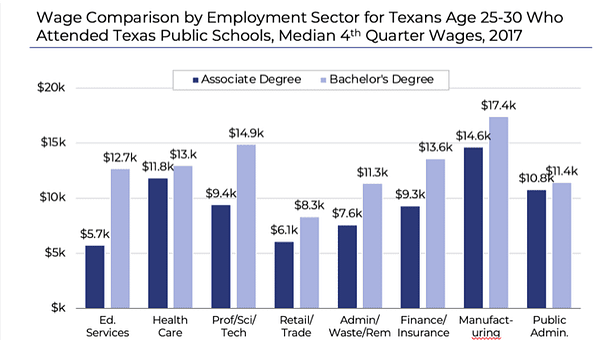It is widely understood that a college degree or credential is becoming increasingly important to attaining a decent job. Far-reaching forces such as automation, artificial intelligence, and globalization are changing the very nature of work and driving education and skill requirements for jobs further and further upward. According to a pre-pandemic analysis, by 2036 71% of all Texas jobs – not just the high-paying ones – will require at least some postsecondary experience.1
 But what is less widely known is that, while earning a degree or credential is critical to attaining a decent job, which degree or credential a student pursues can matter just as much. In Texas, employment and earnings outcomes vary widely based on postsecondary program and industry. For example, at San Jacinto College in Harris County, an associate degree in nursing earns more than twice as much in average starting wages than an academic associate degree.2 As seen in the chart, certain 2-year associate degrees can actually bring higher wages than 4-year bachelor’s degrees in other sectors. The median wages for employees with an associate’s degree in the health care or manufacturing sectors were greater than those of employees with a bachelor’s degree in the retail or administrative sectors.3
But what is less widely known is that, while earning a degree or credential is critical to attaining a decent job, which degree or credential a student pursues can matter just as much. In Texas, employment and earnings outcomes vary widely based on postsecondary program and industry. For example, at San Jacinto College in Harris County, an associate degree in nursing earns more than twice as much in average starting wages than an academic associate degree.2 As seen in the chart, certain 2-year associate degrees can actually bring higher wages than 4-year bachelor’s degrees in other sectors. The median wages for employees with an associate’s degree in the health care or manufacturing sectors were greater than those of employees with a bachelor’s degree in the retail or administrative sectors.3
Texas students deserve clear, relevant information on degree and credential programs before they make enrollment decisions. Choosing the right program can be the difference between attaining a high-paying, fulfilling job and being saddled with crushing student debt and few job prospects. That’s why we are so encouraged by a number of bills recently filed by members of the Texas Legislature for this new Legislative Session. For example, HB 1132, filed by Rep. Oliverson, would ensure that Texas students have access to critical information about postsecondary programs, including median student debt and earnings 1, 5, and 10 years after graduation. HB 755, introduced by Rep. Fierro, mandates that information on student debt and default rates be made available for career schools and colleges.
These bills represent important steps in making our state’s postsecondary system more transparent and student-friendly. If passed, these bills would empower students to make smarter, more informed enrollment decisions and prompt institutions to re-examine programs that lead to high student debt-loads and poor workforce outcomes. After the decision to attend postsecondary, choosing a degree or credential program can be the next-most important decision a student makes. Better information on program outcomes – including readily available information on student earnings and debt – can help more Texas students get this critically important decision right.
